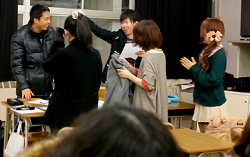Conclusion
The introduction of “Gamer’s Guide to Winning at College through Teamwork” posed an essential question for us to consider as we think beyond college to our relationships, careers, and lives:
After I graduate, will my life involve preparing for tests by listening to lectures, or will it include working with others to solve problems, make decisions, and accomplish goals?
Of course, the answer is that we will not sit in lectures or take tests outside of college. We will apply our knowledge to solve problems while collaborating with people at home, work, and society. This does not mean that lectures and tests lack value; lectures and tests serve an essential purpose in helping us to acquire and demonstrate basic knowledge. However, when we think beyond college, we may recognize that we should spend some of our college life developing collaborative skills to help us be productive members of families, companies, and society.
In providing a framework for learning in a team, “Gamer’s Guide to Winning through College” has provided a framework for helping us to win in life by being effective members and leaders of teams. This framework illuminated the complex interaction among individuals and teams within organizations. Awareness of these levels of social dynamics can illuminate barriers to team success and help us to develop strategies for fostering individual and group performance and satisfaction.
The collaborative process outlined in “Gamer’s Guide” can be as applicable in life as it is to helping us accomplish our goals in the classroom. For example, as a team leader at work, you will want to select members who are ready, willing, and able to do their jobs [Step 1: Preparation]. You will likely have assessment processes through which you evaluate team member readiness to help accomplish group goals, like interviews and performance evaluations [Step 2: Readiness Assessment]. You will probably coach your team in collaborative skills that will allow them to more effectively accomplish goals and complete projects [Step 3: Collaboration]. Finally, whether things go right or wrong, your team will want to reflect on its successes and failures; this will help your team determine how it can improve future activities by learning from mistakes and building on successes [Step 4: Reflection].
Throughout these steps, you will also find that the keys to fostering individual and team effectiveness include
- establishing accountability at the individual, team, and organizational level;
- integrating team objectives and goals with the personal goals of team members and the company, and;
- fostering a dynamic exchange of ideas to encourage creative problem-solving.
In short, you may find that the secret to creating an effective work team is to make it a learning team like the one you will build in the classroom.
-----
Note. Adapted from Assessing the viability of team learning with remedial students in a lecture-based Japanese higher education culture (Duncan, 2013), this is a workshop script from the Team Hachi Project, a series of workshops developed to introduce group dynamics concepts to enhance student performance and satisfaction in college classrooms.
-----





![Your brain can keep growing, adapting, and learning at any age, if you are willing to put in the effort [Image: Copilot]](/images/Images/best-years-for-adult-brain300.png)
